Course Name and Number: Leadership Portfolio of Evidence
VerifiedAdded on 2023/04/26
|8
|1865
|442
Portfolio
AI Summary
This portfolio of evidence examines ethical leadership within the context of a shareholder-focused economy. It analyzes different perspectives on ethical leadership, contrasting views on its feasibility and importance. The portfolio delves into the code of corporate governance, emphasizing the role of values, ethics, and morals in decision-making. Appendix A explores the ethical dilemmas faced by individuals and organizations. Appendix B presents a case study involving an ethical dilemma, focusing on the protagonist's decision-making process and the influence of utilitarianism. The analysis considers the protagonist's moral development stage, moral intensity, and the impact of social consensus. The portfolio concludes by summarizing the application of a utilitarian framework in weighing costs and benefits to achieve maximum satisfaction. The student has provided detailed references to support their analysis.
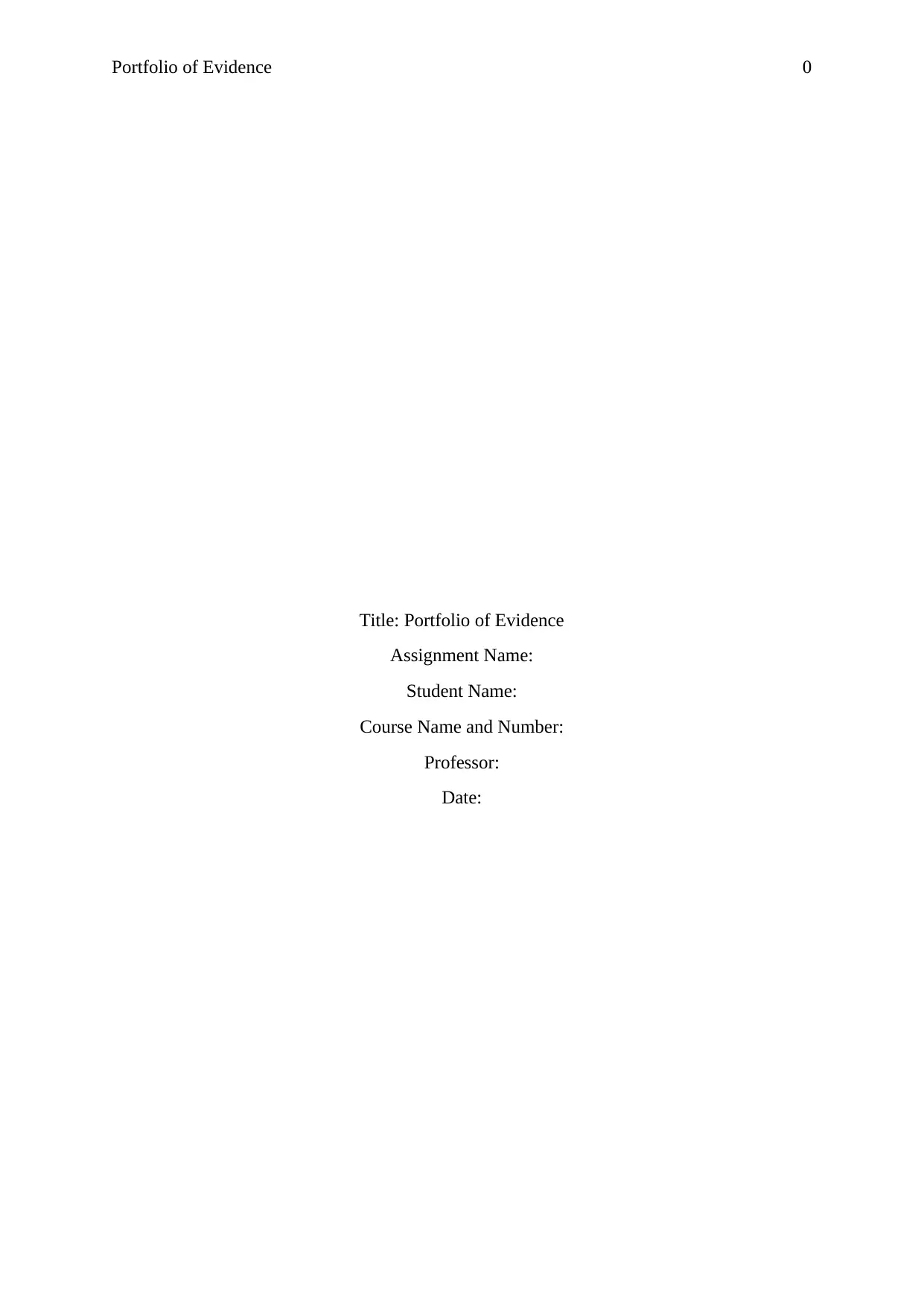
Portfolio of Evidence 0
Title: Portfolio of Evidence
Assignment Name:
Student Name:
Course Name and Number:
Professor:
Date:
Title: Portfolio of Evidence
Assignment Name:
Student Name:
Course Name and Number:
Professor:
Date:
Paraphrase This Document
Need a fresh take? Get an instant paraphrase of this document with our AI Paraphraser
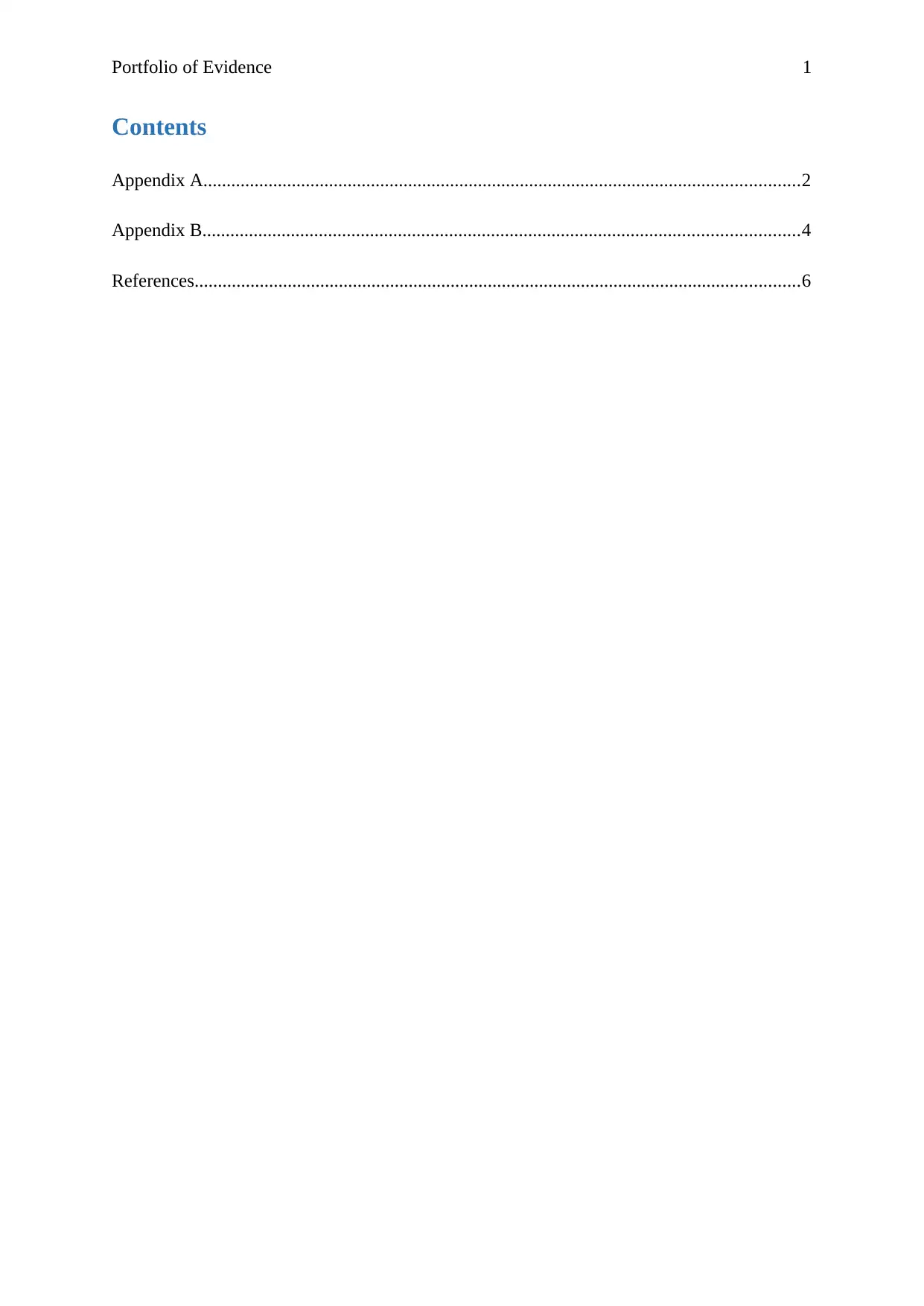
Portfolio of Evidence 1
Contents
Appendix A................................................................................................................................2
Appendix B................................................................................................................................4
References..................................................................................................................................6
Contents
Appendix A................................................................................................................................2
Appendix B................................................................................................................................4
References..................................................................................................................................6
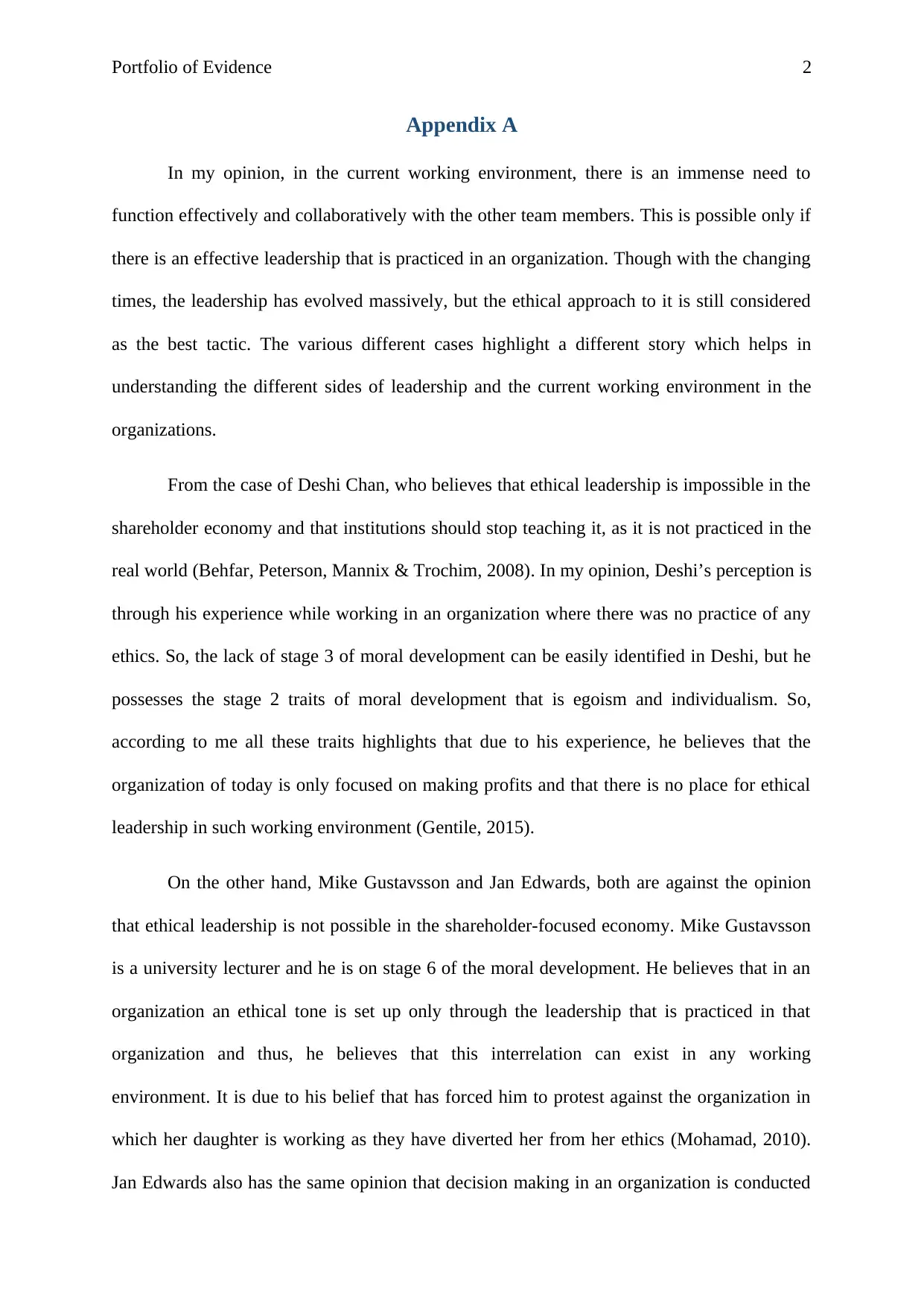
Portfolio of Evidence 2
Appendix A
In my opinion, in the current working environment, there is an immense need to
function effectively and collaboratively with the other team members. This is possible only if
there is an effective leadership that is practiced in an organization. Though with the changing
times, the leadership has evolved massively, but the ethical approach to it is still considered
as the best tactic. The various different cases highlight a different story which helps in
understanding the different sides of leadership and the current working environment in the
organizations.
From the case of Deshi Chan, who believes that ethical leadership is impossible in the
shareholder economy and that institutions should stop teaching it, as it is not practiced in the
real world (Behfar, Peterson, Mannix & Trochim, 2008). In my opinion, Deshi’s perception is
through his experience while working in an organization where there was no practice of any
ethics. So, the lack of stage 3 of moral development can be easily identified in Deshi, but he
possesses the stage 2 traits of moral development that is egoism and individualism. So,
according to me all these traits highlights that due to his experience, he believes that the
organization of today is only focused on making profits and that there is no place for ethical
leadership in such working environment (Gentile, 2015).
On the other hand, Mike Gustavsson and Jan Edwards, both are against the opinion
that ethical leadership is not possible in the shareholder-focused economy. Mike Gustavsson
is a university lecturer and he is on stage 6 of the moral development. He believes that in an
organization an ethical tone is set up only through the leadership that is practiced in that
organization and thus, he believes that this interrelation can exist in any working
environment. It is due to his belief that has forced him to protest against the organization in
which her daughter is working as they have diverted her from her ethics (Mohamad, 2010).
Jan Edwards also has the same opinion that decision making in an organization is conducted
Appendix A
In my opinion, in the current working environment, there is an immense need to
function effectively and collaboratively with the other team members. This is possible only if
there is an effective leadership that is practiced in an organization. Though with the changing
times, the leadership has evolved massively, but the ethical approach to it is still considered
as the best tactic. The various different cases highlight a different story which helps in
understanding the different sides of leadership and the current working environment in the
organizations.
From the case of Deshi Chan, who believes that ethical leadership is impossible in the
shareholder economy and that institutions should stop teaching it, as it is not practiced in the
real world (Behfar, Peterson, Mannix & Trochim, 2008). In my opinion, Deshi’s perception is
through his experience while working in an organization where there was no practice of any
ethics. So, the lack of stage 3 of moral development can be easily identified in Deshi, but he
possesses the stage 2 traits of moral development that is egoism and individualism. So,
according to me all these traits highlights that due to his experience, he believes that the
organization of today is only focused on making profits and that there is no place for ethical
leadership in such working environment (Gentile, 2015).
On the other hand, Mike Gustavsson and Jan Edwards, both are against the opinion
that ethical leadership is not possible in the shareholder-focused economy. Mike Gustavsson
is a university lecturer and he is on stage 6 of the moral development. He believes that in an
organization an ethical tone is set up only through the leadership that is practiced in that
organization and thus, he believes that this interrelation can exist in any working
environment. It is due to his belief that has forced him to protest against the organization in
which her daughter is working as they have diverted her from her ethics (Mohamad, 2010).
Jan Edwards also has the same opinion that decision making in an organization is conducted
⊘ This is a preview!⊘
Do you want full access?
Subscribe today to unlock all pages.

Trusted by 1+ million students worldwide
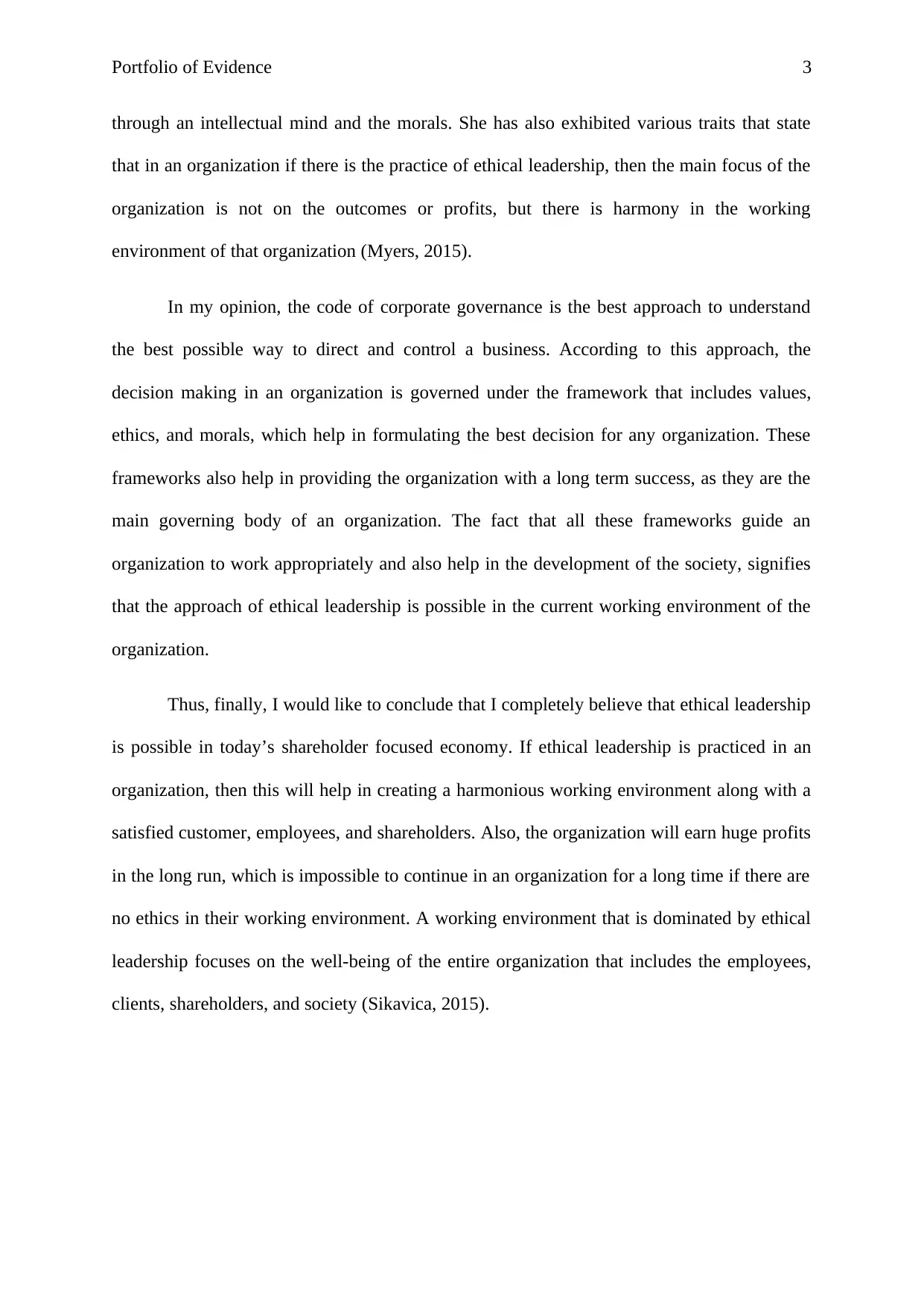
Portfolio of Evidence 3
through an intellectual mind and the morals. She has also exhibited various traits that state
that in an organization if there is the practice of ethical leadership, then the main focus of the
organization is not on the outcomes or profits, but there is harmony in the working
environment of that organization (Myers, 2015).
In my opinion, the code of corporate governance is the best approach to understand
the best possible way to direct and control a business. According to this approach, the
decision making in an organization is governed under the framework that includes values,
ethics, and morals, which help in formulating the best decision for any organization. These
frameworks also help in providing the organization with a long term success, as they are the
main governing body of an organization. The fact that all these frameworks guide an
organization to work appropriately and also help in the development of the society, signifies
that the approach of ethical leadership is possible in the current working environment of the
organization.
Thus, finally, I would like to conclude that I completely believe that ethical leadership
is possible in today’s shareholder focused economy. If ethical leadership is practiced in an
organization, then this will help in creating a harmonious working environment along with a
satisfied customer, employees, and shareholders. Also, the organization will earn huge profits
in the long run, which is impossible to continue in an organization for a long time if there are
no ethics in their working environment. A working environment that is dominated by ethical
leadership focuses on the well-being of the entire organization that includes the employees,
clients, shareholders, and society (Sikavica, 2015).
through an intellectual mind and the morals. She has also exhibited various traits that state
that in an organization if there is the practice of ethical leadership, then the main focus of the
organization is not on the outcomes or profits, but there is harmony in the working
environment of that organization (Myers, 2015).
In my opinion, the code of corporate governance is the best approach to understand
the best possible way to direct and control a business. According to this approach, the
decision making in an organization is governed under the framework that includes values,
ethics, and morals, which help in formulating the best decision for any organization. These
frameworks also help in providing the organization with a long term success, as they are the
main governing body of an organization. The fact that all these frameworks guide an
organization to work appropriately and also help in the development of the society, signifies
that the approach of ethical leadership is possible in the current working environment of the
organization.
Thus, finally, I would like to conclude that I completely believe that ethical leadership
is possible in today’s shareholder focused economy. If ethical leadership is practiced in an
organization, then this will help in creating a harmonious working environment along with a
satisfied customer, employees, and shareholders. Also, the organization will earn huge profits
in the long run, which is impossible to continue in an organization for a long time if there are
no ethics in their working environment. A working environment that is dominated by ethical
leadership focuses on the well-being of the entire organization that includes the employees,
clients, shareholders, and society (Sikavica, 2015).
Paraphrase This Document
Need a fresh take? Get an instant paraphrase of this document with our AI Paraphraser
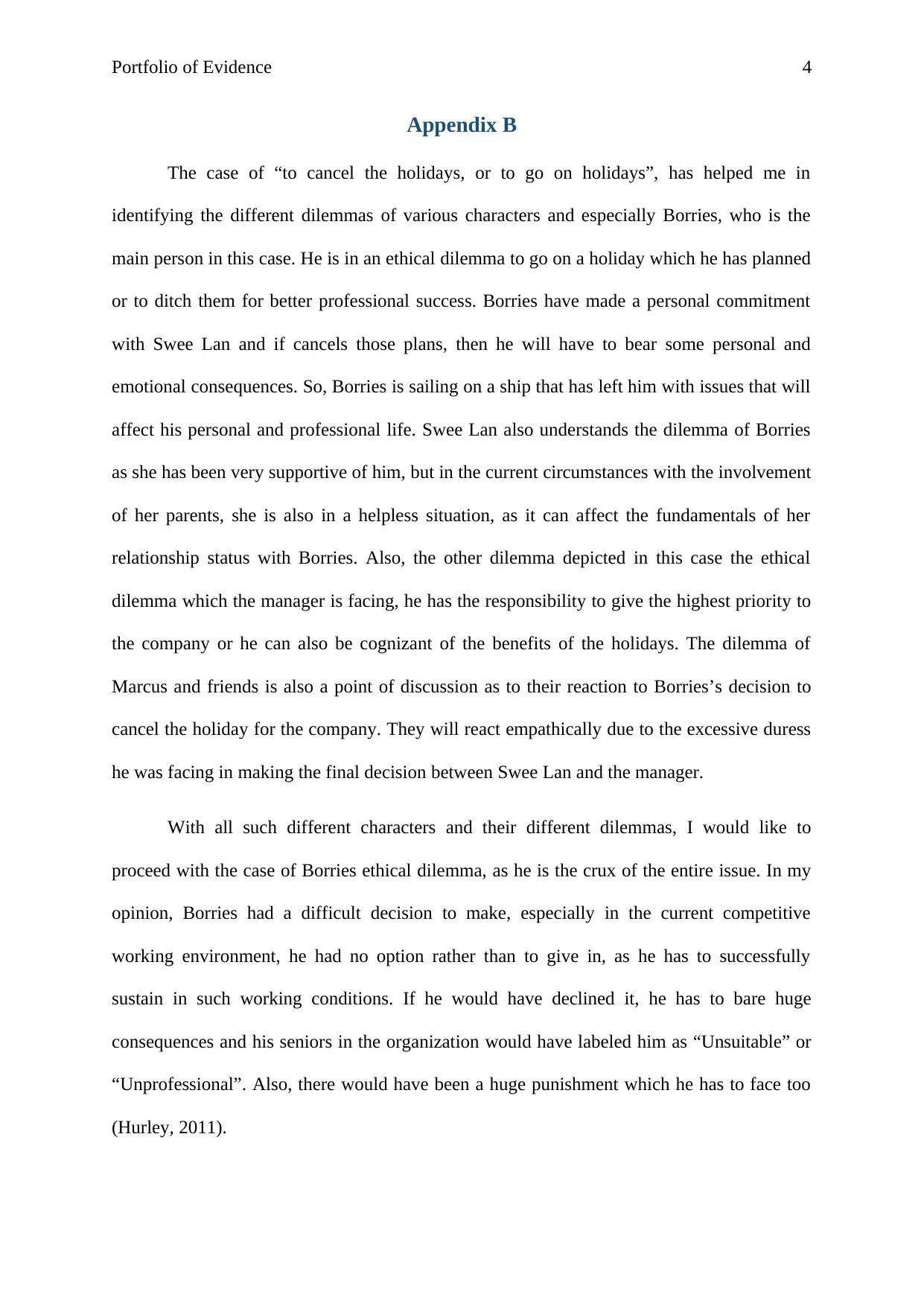
Portfolio of Evidence 4
Appendix B
The case of “to cancel the holidays, or to go on holidays”, has helped me in
identifying the different dilemmas of various characters and especially Borries, who is the
main person in this case. He is in an ethical dilemma to go on a holiday which he has planned
or to ditch them for better professional success. Borries have made a personal commitment
with Swee Lan and if cancels those plans, then he will have to bear some personal and
emotional consequences. So, Borries is sailing on a ship that has left him with issues that will
affect his personal and professional life. Swee Lan also understands the dilemma of Borries
as she has been very supportive of him, but in the current circumstances with the involvement
of her parents, she is also in a helpless situation, as it can affect the fundamentals of her
relationship status with Borries. Also, the other dilemma depicted in this case the ethical
dilemma which the manager is facing, he has the responsibility to give the highest priority to
the company or he can also be cognizant of the benefits of the holidays. The dilemma of
Marcus and friends is also a point of discussion as to their reaction to Borries’s decision to
cancel the holiday for the company. They will react empathically due to the excessive duress
he was facing in making the final decision between Swee Lan and the manager.
With all such different characters and their different dilemmas, I would like to
proceed with the case of Borries ethical dilemma, as he is the crux of the entire issue. In my
opinion, Borries had a difficult decision to make, especially in the current competitive
working environment, he had no option rather than to give in, as he has to successfully
sustain in such working conditions. If he would have declined it, he has to bare huge
consequences and his seniors in the organization would have labeled him as “Unsuitable” or
“Unprofessional”. Also, there would have been a huge punishment which he has to face too
(Hurley, 2011).
Appendix B
The case of “to cancel the holidays, or to go on holidays”, has helped me in
identifying the different dilemmas of various characters and especially Borries, who is the
main person in this case. He is in an ethical dilemma to go on a holiday which he has planned
or to ditch them for better professional success. Borries have made a personal commitment
with Swee Lan and if cancels those plans, then he will have to bear some personal and
emotional consequences. So, Borries is sailing on a ship that has left him with issues that will
affect his personal and professional life. Swee Lan also understands the dilemma of Borries
as she has been very supportive of him, but in the current circumstances with the involvement
of her parents, she is also in a helpless situation, as it can affect the fundamentals of her
relationship status with Borries. Also, the other dilemma depicted in this case the ethical
dilemma which the manager is facing, he has the responsibility to give the highest priority to
the company or he can also be cognizant of the benefits of the holidays. The dilemma of
Marcus and friends is also a point of discussion as to their reaction to Borries’s decision to
cancel the holiday for the company. They will react empathically due to the excessive duress
he was facing in making the final decision between Swee Lan and the manager.
With all such different characters and their different dilemmas, I would like to
proceed with the case of Borries ethical dilemma, as he is the crux of the entire issue. In my
opinion, Borries had a difficult decision to make, especially in the current competitive
working environment, he had no option rather than to give in, as he has to successfully
sustain in such working conditions. If he would have declined it, he has to bare huge
consequences and his seniors in the organization would have labeled him as “Unsuitable” or
“Unprofessional”. Also, there would have been a huge punishment which he has to face too
(Hurley, 2011).
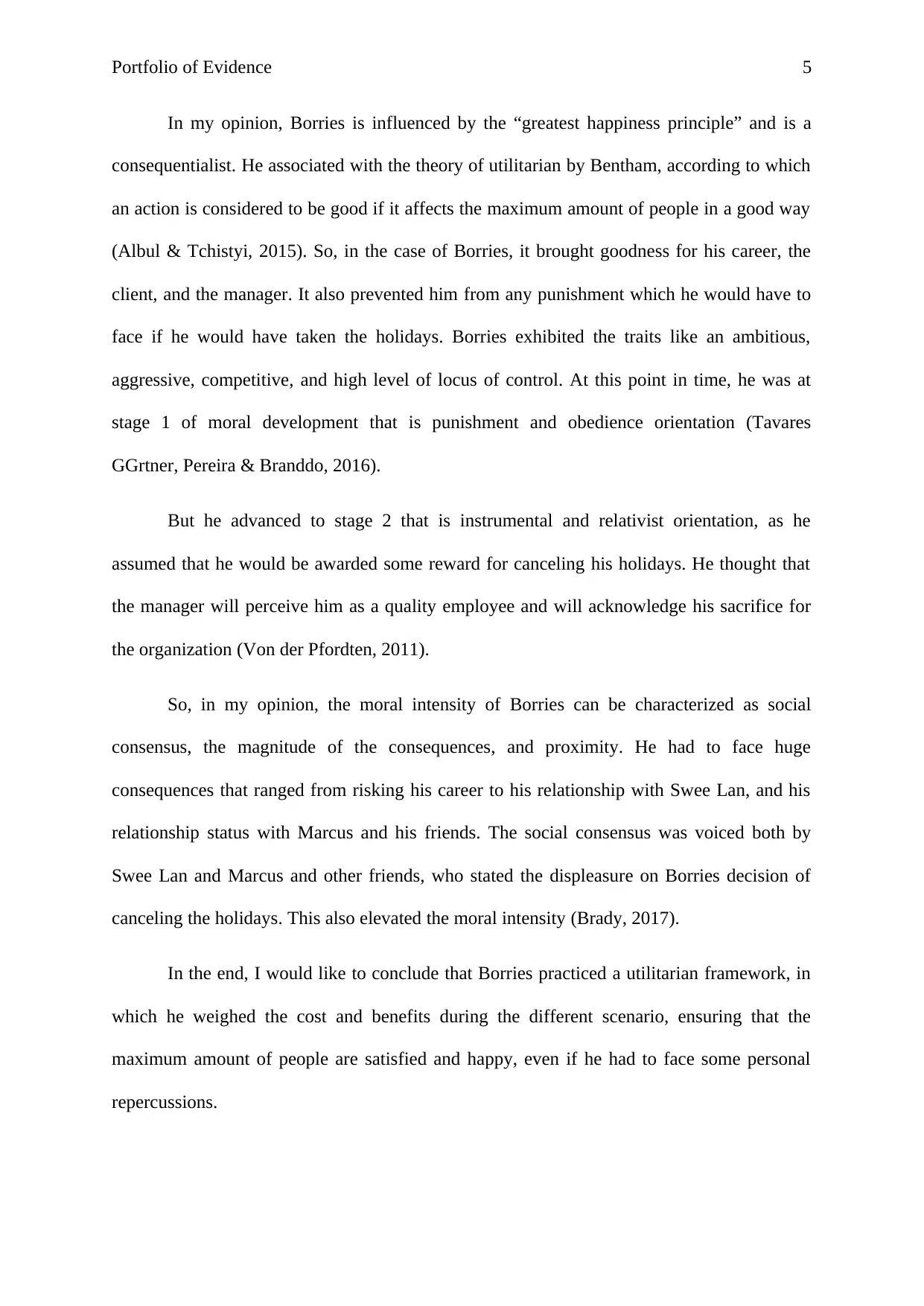
Portfolio of Evidence 5
In my opinion, Borries is influenced by the “greatest happiness principle” and is a
consequentialist. He associated with the theory of utilitarian by Bentham, according to which
an action is considered to be good if it affects the maximum amount of people in a good way
(Albul & Tchistyi, 2015). So, in the case of Borries, it brought goodness for his career, the
client, and the manager. It also prevented him from any punishment which he would have to
face if he would have taken the holidays. Borries exhibited the traits like an ambitious,
aggressive, competitive, and high level of locus of control. At this point in time, he was at
stage 1 of moral development that is punishment and obedience orientation (Tavares
GGrtner, Pereira & Branddo, 2016).
But he advanced to stage 2 that is instrumental and relativist orientation, as he
assumed that he would be awarded some reward for canceling his holidays. He thought that
the manager will perceive him as a quality employee and will acknowledge his sacrifice for
the organization (Von der Pfordten, 2011).
So, in my opinion, the moral intensity of Borries can be characterized as social
consensus, the magnitude of the consequences, and proximity. He had to face huge
consequences that ranged from risking his career to his relationship with Swee Lan, and his
relationship status with Marcus and his friends. The social consensus was voiced both by
Swee Lan and Marcus and other friends, who stated the displeasure on Borries decision of
canceling the holidays. This also elevated the moral intensity (Brady, 2017).
In the end, I would like to conclude that Borries practiced a utilitarian framework, in
which he weighed the cost and benefits during the different scenario, ensuring that the
maximum amount of people are satisfied and happy, even if he had to face some personal
repercussions.
In my opinion, Borries is influenced by the “greatest happiness principle” and is a
consequentialist. He associated with the theory of utilitarian by Bentham, according to which
an action is considered to be good if it affects the maximum amount of people in a good way
(Albul & Tchistyi, 2015). So, in the case of Borries, it brought goodness for his career, the
client, and the manager. It also prevented him from any punishment which he would have to
face if he would have taken the holidays. Borries exhibited the traits like an ambitious,
aggressive, competitive, and high level of locus of control. At this point in time, he was at
stage 1 of moral development that is punishment and obedience orientation (Tavares
GGrtner, Pereira & Branddo, 2016).
But he advanced to stage 2 that is instrumental and relativist orientation, as he
assumed that he would be awarded some reward for canceling his holidays. He thought that
the manager will perceive him as a quality employee and will acknowledge his sacrifice for
the organization (Von der Pfordten, 2011).
So, in my opinion, the moral intensity of Borries can be characterized as social
consensus, the magnitude of the consequences, and proximity. He had to face huge
consequences that ranged from risking his career to his relationship with Swee Lan, and his
relationship status with Marcus and his friends. The social consensus was voiced both by
Swee Lan and Marcus and other friends, who stated the displeasure on Borries decision of
canceling the holidays. This also elevated the moral intensity (Brady, 2017).
In the end, I would like to conclude that Borries practiced a utilitarian framework, in
which he weighed the cost and benefits during the different scenario, ensuring that the
maximum amount of people are satisfied and happy, even if he had to face some personal
repercussions.
⊘ This is a preview!⊘
Do you want full access?
Subscribe today to unlock all pages.

Trusted by 1+ million students worldwide
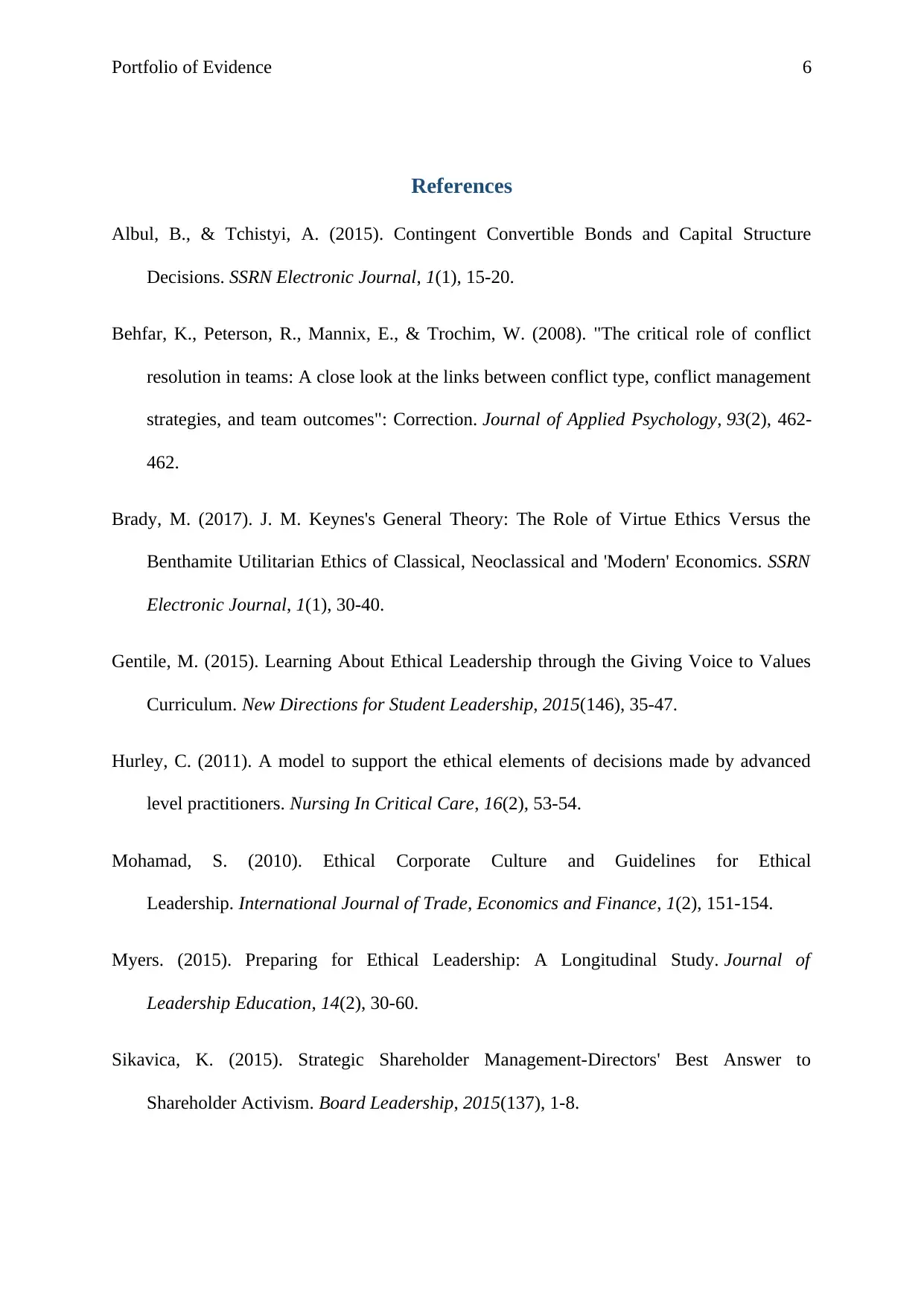
Portfolio of Evidence 6
References
Albul, B., & Tchistyi, A. (2015). Contingent Convertible Bonds and Capital Structure
Decisions. SSRN Electronic Journal, 1(1), 15-20.
Behfar, K., Peterson, R., Mannix, E., & Trochim, W. (2008). "The critical role of conflict
resolution in teams: A close look at the links between conflict type, conflict management
strategies, and team outcomes": Correction. Journal of Applied Psychology, 93(2), 462-
462.
Brady, M. (2017). J. M. Keynes's General Theory: The Role of Virtue Ethics Versus the
Benthamite Utilitarian Ethics of Classical, Neoclassical and 'Modern' Economics. SSRN
Electronic Journal, 1(1), 30-40.
Gentile, M. (2015). Learning About Ethical Leadership through the Giving Voice to Values
Curriculum. New Directions for Student Leadership, 2015(146), 35-47.
Hurley, C. (2011). A model to support the ethical elements of decisions made by advanced
level practitioners. Nursing In Critical Care, 16(2), 53-54.
Mohamad, S. (2010). Ethical Corporate Culture and Guidelines for Ethical
Leadership. International Journal of Trade, Economics and Finance, 1(2), 151-154.
Myers. (2015). Preparing for Ethical Leadership: A Longitudinal Study. Journal of
Leadership Education, 14(2), 30-60.
Sikavica, K. (2015). Strategic Shareholder Management-Directors' Best Answer to
Shareholder Activism. Board Leadership, 2015(137), 1-8.
References
Albul, B., & Tchistyi, A. (2015). Contingent Convertible Bonds and Capital Structure
Decisions. SSRN Electronic Journal, 1(1), 15-20.
Behfar, K., Peterson, R., Mannix, E., & Trochim, W. (2008). "The critical role of conflict
resolution in teams: A close look at the links between conflict type, conflict management
strategies, and team outcomes": Correction. Journal of Applied Psychology, 93(2), 462-
462.
Brady, M. (2017). J. M. Keynes's General Theory: The Role of Virtue Ethics Versus the
Benthamite Utilitarian Ethics of Classical, Neoclassical and 'Modern' Economics. SSRN
Electronic Journal, 1(1), 30-40.
Gentile, M. (2015). Learning About Ethical Leadership through the Giving Voice to Values
Curriculum. New Directions for Student Leadership, 2015(146), 35-47.
Hurley, C. (2011). A model to support the ethical elements of decisions made by advanced
level practitioners. Nursing In Critical Care, 16(2), 53-54.
Mohamad, S. (2010). Ethical Corporate Culture and Guidelines for Ethical
Leadership. International Journal of Trade, Economics and Finance, 1(2), 151-154.
Myers. (2015). Preparing for Ethical Leadership: A Longitudinal Study. Journal of
Leadership Education, 14(2), 30-60.
Sikavica, K. (2015). Strategic Shareholder Management-Directors' Best Answer to
Shareholder Activism. Board Leadership, 2015(137), 1-8.
Paraphrase This Document
Need a fresh take? Get an instant paraphrase of this document with our AI Paraphraser
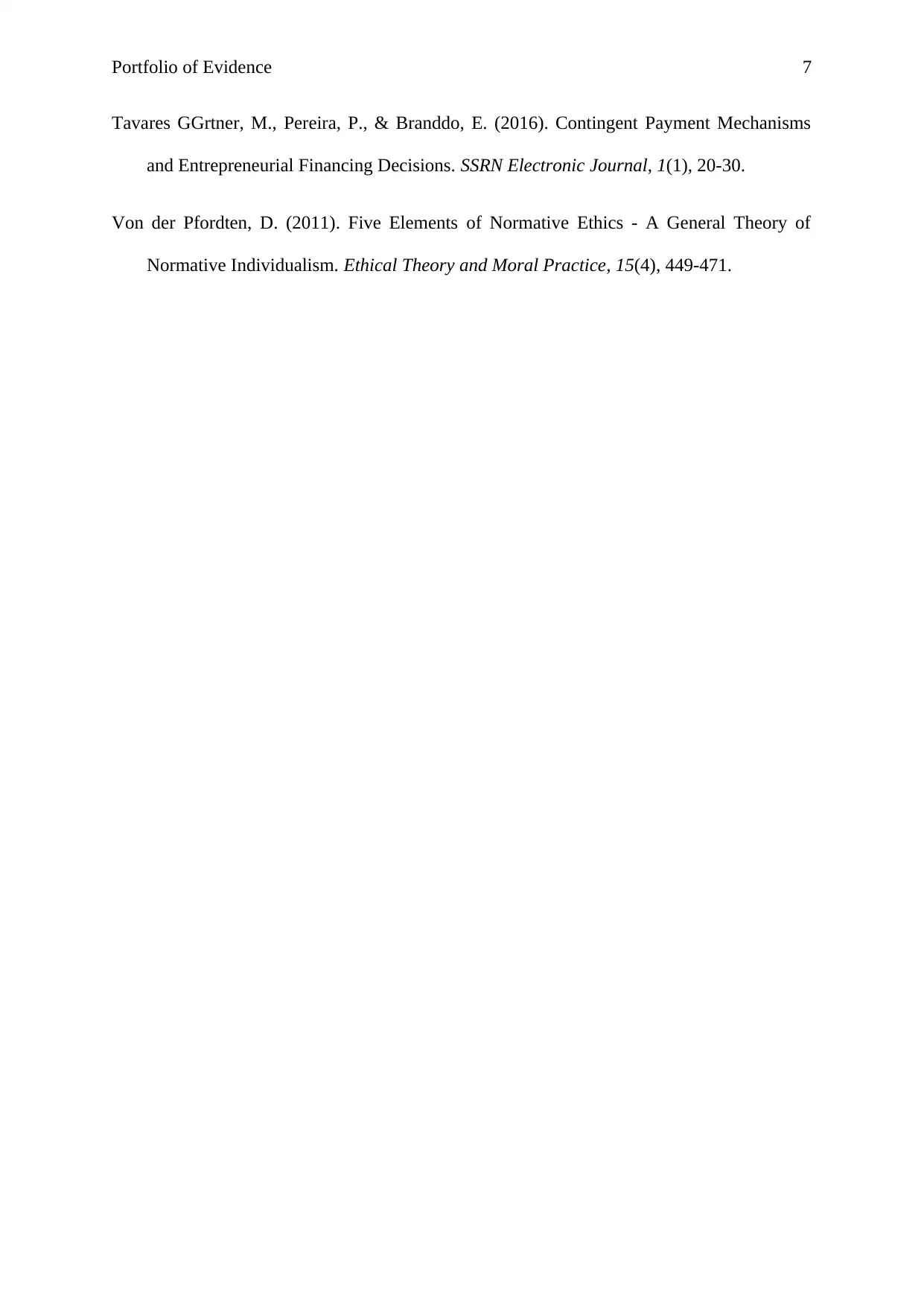
Portfolio of Evidence 7
Tavares GGrtner, M., Pereira, P., & Branddo, E. (2016). Contingent Payment Mechanisms
and Entrepreneurial Financing Decisions. SSRN Electronic Journal, 1(1), 20-30.
Von der Pfordten, D. (2011). Five Elements of Normative Ethics - A General Theory of
Normative Individualism. Ethical Theory and Moral Practice, 15(4), 449-471.
Tavares GGrtner, M., Pereira, P., & Branddo, E. (2016). Contingent Payment Mechanisms
and Entrepreneurial Financing Decisions. SSRN Electronic Journal, 1(1), 20-30.
Von der Pfordten, D. (2011). Five Elements of Normative Ethics - A General Theory of
Normative Individualism. Ethical Theory and Moral Practice, 15(4), 449-471.
1 out of 8
Related Documents
Your All-in-One AI-Powered Toolkit for Academic Success.
+13062052269
info@desklib.com
Available 24*7 on WhatsApp / Email
![[object Object]](/_next/static/media/star-bottom.7253800d.svg)
Unlock your academic potential
Copyright © 2020–2026 A2Z Services. All Rights Reserved. Developed and managed by ZUCOL.





